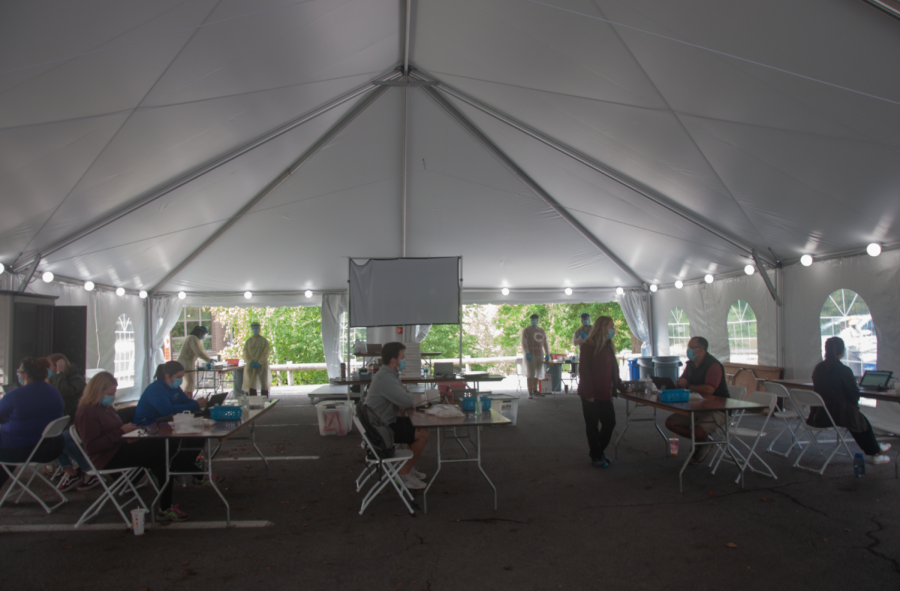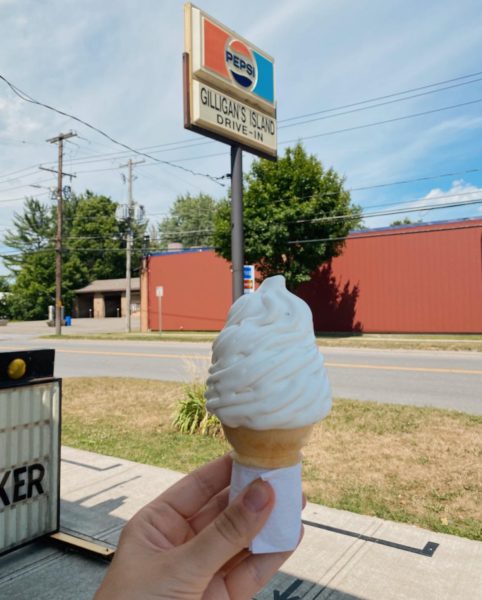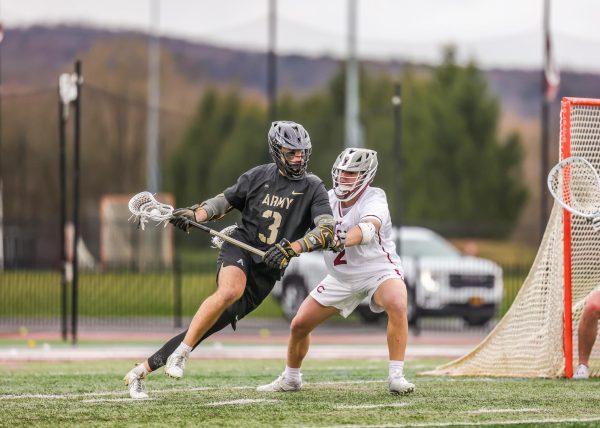COVID-19 Testing: Colgate’s New Normal
Three weeks after Colgate students said farewell to their five-month summer recess and began to prepare for the fall semester either on or off-campus, students who returned to campus now must abide by Colgate’s Student Commitment to Community Health, which outlined the guidelines for the “new normal” on campus in their daily lives. By signing this document, students pledged to embrace health education, face coverings, physical distancing and quarantine or self-isolation requirements of this unique semester. Students also agreed to submit to regular testing and health checks, along with compliance to contact tracing through the Madison County Department of Health.
Students first arrived on campus on Aug. 23 and, like sophomore Lauren Wakeman, used the now-required face masks to hide layers of emotion and uncertainty.
“[I] was a little nervous before everyone was tested because [I] wanted to interact with people [I] hadn’t seen in months, but no one could be certain if their tests would come back negative,” Wakeman said.
Upon arrival, students registered under a large white tent at distanced registration desks situated behind Donovan’s Pub. There, students were given welcome bags filled with all of the quarantine essentials: a thermometer, disinfectant wipes and two face masks. Students were also asked to sign up for a COVID-19 test within the first 24 hours of arriving on campus.
“The tables were all spread out and volunteers were wearing face shields, masks and gloves. They were also sanitizing everything we touched to make sure everyone was safe,” sophomore Rena Landberg said.
With cotton swabs in test tubes, meticulously lined up and ready to go, students one by one carefully swabbed each nostril for about ten seconds.
“People often think that the [COVID-19] tests are painful, but I had taken the at-home test that Colgate sent to us in the mail before arriving on campus, so I kind of knew what to expect. It didn’t hurt, but [it was] definitely an uncomfortable feeling,” Josh Belgrad ’23 said.
After the first round of testing, 23 students were positive, amounting to an infection rate of 0.8 percent.
Following the instructions outlined in ‘Gate 0, students were required to follow a strict quarantine in which meals were delivered to their buildings and outdoor time was limited to 9:00 am – 11:00 am and 2:30 pm – 4:30 pm.
“I thought the ‘outdoor time’ would be a lot stricter, at least for those first few weeks. I was expecting a full quarantine,” sophomore Michael Tribuzio said. “But it’s all relative. [Colgate] has done so much more than other schools… they have really made [COVID-19] their number one priority.”
A few days later, Colgate went through its second round of testing. Trubuzio stated that he was apprehensive, knowing that a positive test for him or a close contact would alter his semester due to Colgate’s isolation protocols.
“It’s easy to be worried when the stakes are high. I would go home because I live within five hours [away], so I wouldn’t be sent to the Wendt Inn to quarantine,” he said.
Students entered the second round of testing on Aug. 31 with hopes that positive cases would be low. After testing more than 2,500 students, 13 new positive cases surfaced, bringing the total number of COVID-19 cases to 36 since arrival day on Aug. 24.
Even with these additional cases, the University was still on track to embrace Gate 1 on Sep. 8, after which pre-made meals were no longer being delivered to student’s dorm buildings.
Now, students are encouraged to take advantage of the safe and efficient pop-up venues around campus. Meals from Ray Brothers BBQ, Colgate Inn, FoJo Beans and Royal India Grill can be enjoyed all over campus. These new additions to dining and strict rules that encourage students to socialize outdoors have allowed for campus life to bustle with more activity. Students can frequently be found eating outdoors, playing games on the quad or going on walks around campus, soaking up the warm weather before the leaves begin to change color.
Living in the townhouses, Junior Ryan Heil has made the most of the outdoor opportunities. “[I’ve been] enjoying time up the hill, outside and on the trails, and reabsorbing the … college culture that we’ve been missing out on in the last couple of weeks,” Heil said.
However, new freedoms also come with greater responsibilities. With fewer restrictions, the responsibility now lies in the hands of students to keep themselves and others accountable when it comes to health and safety during these trying times.
“Coming all the way across the country to Colgate, I am definitely still scared to be sent home,” Belgrad, a Phoenix, Az. resident said. “It’s something that’s always in the back of my mind, so I am just trying to be extra cautious.”
When students signed the Colgate Student Commitment to Community Health, they all pledged to keep each other safe. Regardless of the added responsibilities of Colgate students, Heil is optimistic about the future and truly believes in the student body.
“As long as people continue to follow the guidelines set by the administration and put the needs of the community before their own,” Belgrad said.








